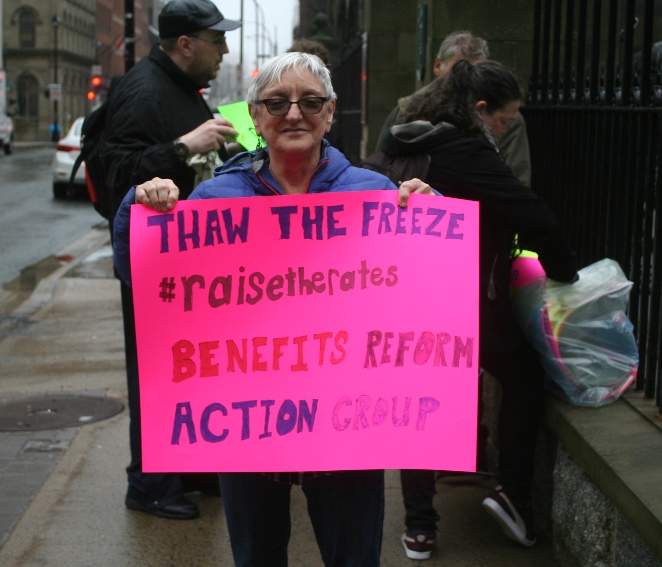KJIPUKTUK (Halifax) – A recent decision by the Nova Scotia Court of Appeal found that the department of Community Services was wrong to cut off welfare benefits from innocent family members for something the “head of the family” did wrong.
Significantly, the Court of Appeal based that decision on not only a sense of fairness, but also on Nova Scotia’s international human rights obligations, equality rights of women under the Charter, and the racialized nature of poverty.
Now a coalition of 20 community groups from across Nova Scotia is asking that Community Services review all its current practices for similar signs of discrimination. It also demands that all people unjustly deprived of benefits in the past get their money back.

Signatories include Adsum for Women and Children, the Antigonish Women’s Resource Centre, the Benefit Reform Action Group, Community Advocates Network, CSEP, Dalhousie Legal Aid Service, the North End Community Health Centre, SHYFT Youth Services, Sydney’s Every Woman’s Centre, and many more.
These kinds of suspensions happen a lot, says Fiona Traynor, a Dalhousie Legal Aid worker who helped pull the coalition together. And not just because of a missed an appointment with an employment counsellor, as was the case with the family directly affected by the court decision.
“There are other key parts of the regulations where the department can and will cut off entire families because one person in the family doesn’t meet expectations. For instance, if an applicant can’t provide proof of citizenship, if you quit a job or are fired, if you refuse to undergo a medical assessment. It’s a wide net,” Traynor says.
Even going on strike, or being locked out can be reason for a family’s benefits to be withheld. “When you are locked out, as a worker you have no control over that whatsoever. It’s quite unbelievable,” Traynor says.
And not only are these cut-offs fairly common, they are also difficult to fight. People frequently only find out about these punitive measures when their cheque doesn’t arrive. Hearings and appeals are an afterthought, Traynor says.
“After they’re cut off people have to go through a two-stage appeal process, which can take as long as three months sometimes, and during that time we have families, including children, who are without pharmacare coverage, without dental coverage, without any kind of backup system as far as rent goes, paying the bills. People are put into tailspins that often lead to homelessness or worse.”
People should get their money back
The ad hoc coalition calls for restitution to all family members whose benefits were unjustly cut off. For Traynor that only makes sense.
“The group thinks it would be fair and just for the department to follow through on their announcement that they are going to look at their caseload to see what families have been impacted by this type of action,” says Traynor. “Of course these families should have full restitution of what they are owed, even if it goes back to the year 2000 when the practice started,” she says.
The group wants the announced review to be public. For too long the department of Community Services has been a black box to anybody but its own bureaucrats, Traynor argues.
“We want to know what’s happening, and we want groups like ours included in that review,” she says. “The government should not be able to do this behind closed doors anymore. That lack of public scrutiny has been the problem all along.”
“We are mobilizing provincially, in numbers that they can’t ignore”
It was easy to mobilize the twenty groups (and counting), says Traynor, and the news release came together in just a couple of days. That tells her that the coalition has huge potential.
“This kind of province-wide mobilization is vitally important. Without it the government will continue to mishandle an income assistance program that is vital to the survival of so many people across this province,” says Traynor.
The coalition is especially relevant because of the ongoing secretive income assistance transformation project that is reshaping how welfare is delivered, without any real input from the people directly affected and their allies.
“The government is getting away with saying it is consulting with organizations and first voice people, but all that they do is tell us selectively what they are planning,” says Traynor, who has attended some of these sessions.
And Traynor is not impressed with the equally secretive consultation between the department and the United Way Halifax chapter that has been ongoing for a while.
“I am speaking for myself here, not on behalf of the group, but United Way does not represent the community. The United Way adheres to a charity model to fix things, and that is only a short term and short sighted way to address poverty,” Traynor says.
Similarly, private meetings between bureaucrats and community advocates, although useful, are no longer good enough, Traynor says. “That type of engagement is not creating a climate where we feel included. That this coalition came together so quickly shows how important this work is, and also how dissatisfied people are with the current processes.”
“There will be more groups joining us, and the community is not going to back down, and we are going to make demands,” Traynor says. “We are mobilizing provincially, in numbers that they can’t ignore.”
We asked the Department of Community Services to comment on the coalition’s news release, and we will update this story when we receive a response.
Updated: Department’s response
Updated November 16, 8:30 PM. The Department isn’t interested in looking at any other regulations is still studying the decision, says Heather Fairbairn, spokesperson for the department.
“To provide context around the decision, based on our initial review, out of 25,800 cases and about 39,000 beneficiaries, there were approximately 53 cases between April and September 2017 where similar action may have been undertaken,” writes Fairbairn, numbers referring only to ESIA regulation 20, which deals with a recipient’s willingness to find employment.
Nor does the department intend to go back in time and reimburse affected family members for moneys it withheld between the year 2000 and now. “Any changes resulting from the court’s ruling will be applied to cases on a go-forward basis,” Fairbairn writes.
“We do not take the suspension of benefits lightly. Such action is only undertaken in situations as a last resort,” Fairbairn writes. That of course was never the issue. The court decision is about the way suspensions affect innocent family members.
Departmental response corrected as per strike -out and italics on November 17, 17 pm.
Click here for a copy of the news release issued by the coalition; Click here for the full departmental response.
If you can, please support the Nova Scotia Advocate so that it can continue to cover issues such as poverty, racism, exclusion, workers’ rights and the environment in Nova Scotia. A pay wall is not an option since it would exclude many readers who don’t have any disposable income at all. We rely entirely on one-time donations and a tiny but mighty group of kindhearted monthly sustainers.



